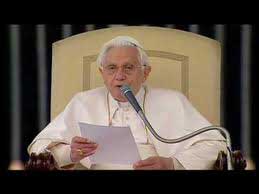DIALECTIC OF PRAYER: HUMAN CRY AND DIVINE RESPONSE
VATICAN CITY, 7 SEP 2011 (VIS) – This morning Benedict XVI travelled by helicopter
from the Apostolic Palace in Castelgandolfo to the Vatican for his weekly general audience in St. Peter’s Square.
Continuing a series of catecheses on the subject of “the school of prayer”, the Holy Father turned his attention to Psalm 3 which recounts David’s flight from Jerusalem when Absalom rose against him. “In the Psalmist’s lament”, the Pope said, “each of us may recognise those feelings of pain and bitterness, accompanied by faith in God, which, according the biblical narrative, David experienced as he fled from his city”.
In the Psalm, the king’s enemies are many and powerful, and the imbalance between David’s forces and those of his persecutors “justifies the urgency of his cry for help”. Nonetheless his adversaries “also seek to break his bond with God and to undermine the faith of their victim by insinuating that the Lord cannot intervene”.
Thus, the aggression “is not only physical, it also has a spiritual dimension” aimed at “the central core of the Psalmist’s being. This is the extreme temptation a believer suffers: the temptation of losing faith and trust in the closeness of God”, the Holy Father said.
Yet, as the Book of Wisdom says, the unrighteous are mistaken because “the Lord … is like a shield protecting those who entrust themselves to Him. He causes them to raise their heads in sign of victory. Man is no longer alone … because the Lord hears the cry of the oppressed. … This intertwining of human cry and divide response is the dialectic of prayer and the key to reading the entire history of salvation. A cry expresses a need for help and appeals to the faithfulness of the other. To cry out is an act of faith in God’s closeness and His willingness to listen. Prayer express the certainty of a divine presence which has already been experienced and believed, and which is fully manifested in the salvific response of God”.
Psalm 3 presents us “a supplication replete with faith and consolation. By praying this Psalm we share the sentiments of the Psalmist: a just but persecuted figure which would later be fulfilled in Jesus. In pain, danger and the bitterness of misunderstanding and offence, the words of this Psalm open our hearts to the comforting certainty of faith. God is always close, even in times of difficulty, problems and darkness. He listens, responds and saves.
“However”, the Pope added, “it is important to be able to recognise His presence and to accept His ways: like David during his humiliating flight from his son Absalom, like the persecuted righteous of the Book of Wisdom and, finally and fully, like the Lord Jesus on Golgotha. In the eyes of the unrighteous it appeared that God did not intervene and that His Son died, but for believers it was at that precise moment that true glory was manifested and definitive salvation achieved”.
The Pope concluded: “May the Lord give us faith, may He come in aid of our weakness and help us to pray in moments of anguish, in the painful nights of doubt and the long days of pain, abandoning ourselves trustingly to Him, our shield and our glory”.
AG/ VIS 20110907 (550)



 hy, O
hy, O 
Thank you, Holy Father